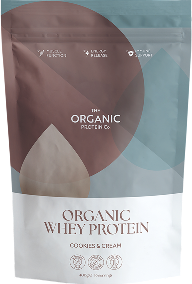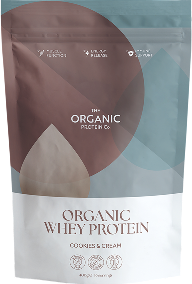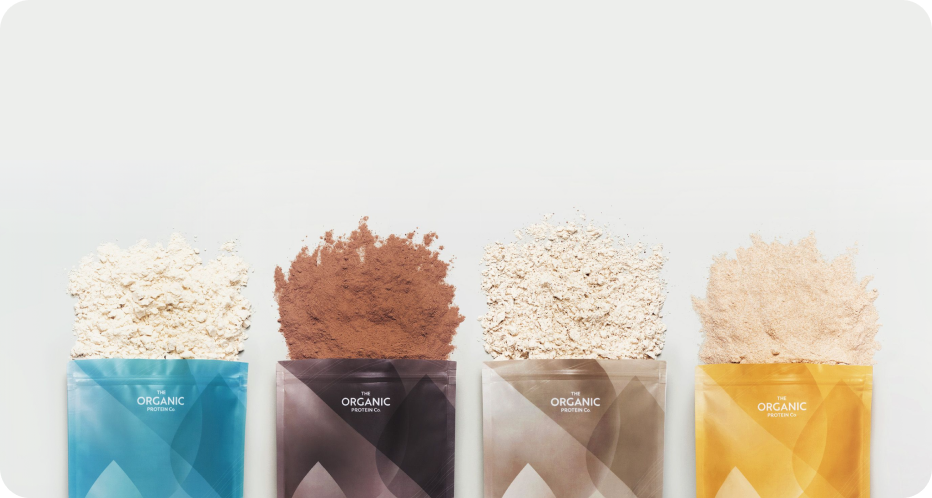Protein powders are brilliant for upping protein intake, supporting muscle health, and aiding weight management. But how do they fit into a diabetes-friendly lifestyle? Can a diabetic safely use protein powders?
In this guide, we’ll answer the big questions, like how it might affect blood sugar levels and which options are the best for diabetics. Whether you’re managing type 1, type 2, or prediabetes, read on to discover how protein powder can play a role in your nutrition plan.
Can diabetics safely use protein powder?
In short, diabetics can safely use protein powder provided they choose the right type and quality. Avoiding powders which are laden with added sugars and artificial ingredients is key to a protein-packed diet that remains diabetes-friendly, too.
For most diabetics, protein powder can support general nutritional needs by increasing protein intake. This can help balance meals, making it easier to manage hunger and maintain energy levels throughout the day. Whey protein powders, for example, are nutrient-dense options that pair well with many active lifestyles.
While protein powders can be a helpful tool, they should be part of a balanced diet, focused mainly on whole foods, tailored to individual health goals and conditions.

How does protein affect blood sugar?
As a macronutrient, protein plays a role in helping to manage blood sugar levels, which is an important consideration for diabetics. (1)
Unlike carbohydrates, which cause a rapid rise in blood glucose levels, (2) protein has a stabilising effect on blood sugar levels. When included in a meal or shake, protein slows the digestion and absorption of glucose, helping to prevent sharp spikes or crashes. (3)
Whey protein and blood sugar
Whey protein, in particular, has been shown to have additional benefits for blood sugar regulation. Studies suggest that whey protein can stimulate insulin secretion (the hormone essential for transporting glucose from the blood into cells for energy). (4)
This insulin response may be especially beneficial for people with type 2 diabetes, as it helps improve glycaemic control when consumed alongside carbohydrates. (5)

Choosing the best protein powder for diabetics
Choosing the right protein powder as a diabetic, or to support someone with diabetes, isn’t just a question of different sources of protein. Clean, simple formulas with minimal ingredients are your best bet.
First and foremost, avoid options with the below by checking the ingredients list and nutritional information:
- Added sugars
- Excessive carbohydrates
- Artificial ingredients (though artificial sweeteners are an accepted substitute for sugar for a diabetic)
Different protein sources for diabetics
Whey protein
Whey protein has been shown to support blood sugar regulation by stimulating insulin secretion and slowing glucose absorption. For those looking to minimise carbohydrate intake, whey protein isolate could be particularly beneficial, as it offers higher protein content with fewer carbs and fats compared to whey protein concentrate.
Plant-based protein powders
For those who follow a vegan or dairy-free diet, plant-based protein powders made from sources like pea or brown rice protein are a good alternative. These options are common culprits for added sugars or additives, however, so be sure to check the label first.
Organic protein powders
Organic options are minimally processed and free from synthetic additives or pesticides. Choosing organic ensures your protein powder aligns with a wholefood, additive-free approach to nutrition, as well as being diabetic-friendly.

What are the benefits of protein powder in a diabetic diet?
1. Blood sugar stabilisation
As we’ve seen, protein has a stabilising effect on blood sugar levels by slowing the digestion and absorption of glucose. Including protein powder in meals or snacks, alongside a primarily whole-food diet, can help prevent sharp blood sugar spikes or crashes – a critical aspect of diabetes management.
2. Weight management
Managing weight is often an important part of diabetes care, and protein powder can play a supportive role. High-protein diets are associated with increased feelings of fullness, which can reduce overall calorie intake and help control appetite. (6)
By adding protein powder to shakes or meals, diabetics can enjoy a satisfying, nutrient-rich option that helps with staying on track with weight management and weight loss goals.
3. Muscle support
Maintaining muscle mass is essential for overall health and metabolism, particularly for individuals with diabetes. (7) Protein, specifically its constituent amino acids, is a key building block for muscles. Protein powder offers an easy and effective way to meet daily protein requirements and support healthy muscles.
Risks and considerations for diabetics using protein powder
Hidden sugars and additives
Some protein powders contain added sugars, artificial sweeteners, or flavourings that can cause blood sugar spikes or negatively impact overall health.
Excessive protein intake
Overconsumption of protein, whether through diet or supplements, can strain the kidneys, (8) especially for individuals with pre-existing kidney conditions often linked to diabetes. Moderation is key, and it’s essential to balance protein powder intake with other dietary protein sources.

Unbalanced diets
Relying solely on protein powder as a primary food source can lead to nutrient imbalances. While protein powders are convenient, they should complement a well-rounded diet rather than replace whole foods.
Consult a healthcare professional
Before making significant dietary changes or incorporating protein powder into your routine, consult your doctor or a registered dietitian. They can help tailor recommendations to your specific health needs and ensure safe integration into your diabetes management plan.
Tips for adding protein powder into a diabetic diet
Protein powder can be a versatile addition to your diet when used effectively. Here’s how to make the most of it:
1. Use for breakfast or a midday snack
Adding protein powder into your daily breakfast, such as protein porridge, can help keep you satiated and avoid blood sugar spikes in the morning.
Protein shakes or protein powder bakes, like protein balls, make excellent snacks. They’re quick to prepare and can help stabilise your blood sugar levels between meals.

2. Pair with high-fibre and healthy fat ingredients
For balanced nutrition, mix protein powder with ingredients that provide fibre and healthy fats. Examples include unsweetened almond milk, chia seeds, avocado, or a handful of nuts. These additions help slow digestion and keep blood sugar levels steady.
3. Monitor portion sizes
Stick to the recommended serving size on the packaging, typically around a 15–25g scoop. This ensures you’re getting the right amount without overdoing it.
Can a diabetic take protein powder? The bottom line
Protein powder can be a valuable addition to a diabetic diet when chosen thoughtfully. With its ability to stabilise blood sugar levels, aid in weight management, and support muscle health, it offers numerous benefits for those managing diabetes.
The key lies in choosing high-quality, clean-label options free from added sugars and artificial ingredients. By focusing on minimally processed, balanced protein powders, diabetics can enjoy the convenience of protein powders while maintaining control over their health.
Always consult with a healthcare professional to tailor your choices to your specific needs.














